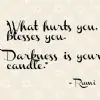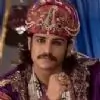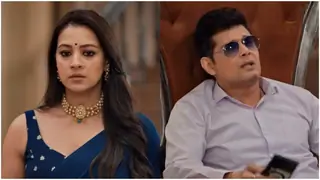Originally posted by: sashashyam
End game:
Chandragupta has finally, after a very hard fought struggle, managed to get the better of the gigantic Malayaketu.
And look how he had done it!
There is a passage in Kalki's historical "Sivakamiyin Sabatham", where Kundotharan ( a Pallava spy) describes the battle where Mamallan was fighting his enemies.. It goes thus...
" Kundotharan describes, 'When Mamallar entered the battlefield and weilded his sword, it didn't look like an ordinary battle sword.. It sparkled like the Chakrayud of Lord Vishnu .. Hundreds of lightning sparks emerged from that sword.. Each spark cut off the head of an enemy.. Oh God! Even in that dark night, we were able to locate where Mammalar was fighting because the sparkles emitted by the swinging blow of his sword and the fire emitted from his eyes made the place so bright...All along the path he went, the bodies of the enemies were strewn..."
(Chapter 25, SS part II)
Earlier, they had seemed more or less evenly matched. Even after he has been unhorsed, Malayaketu manages to trip up Chandra - who descends from his horse for a reason which I at least failed to grasp! - with a circular sweep of his leg. In the next round, each kicks the other flat on his back.
But Chandra comes to his feet with the swift athletic move of a trained gymnast, drums on his chest and roars, exactly like, if I could be permitted a most anachronistic comparison, Tarzan, Lord of the Jungle. It is a scary sight.
Perhaps in tune with that ferocious mood - wanting to wreak bare-handed vengeance on his foe - he discards his sword and rushes at Malayaketu. The impact when they collide is like two mountains crashing into each other. When they then headbutt each other repeatedly, and blood trickles down their foreheads, it is as if this is the preparation for a blood sacrifice. But by whom and of whom?
The answer comes almost immediately, as Chandra, who bares his teeth in a vulpine snarl, is picked up and tossed to the ground by Malayaketu. But before his enemy can move to the kill, Chandra somersaults in a full circle, with a lithe grace that owes nothing to VFX, and kicks Malayaketu backwards. He then grabs his opponent, heaves his huge body up, literally over his own head, roars again like the predator he is at that moment, and dumps it on the ground with a resounding thud. End of Malayaketu.
I really really appreciate how very aptly you have chosen the title "Samhar". Virtue vs Evil .. Chandragupta reminds me of Narasimhavadar, with his rage, his savagery ferociousness of a wild beast etc.
Successful ruse: Chandra, however, is not even looking at his enemy sprawled helplessly on the ground. He is looking across at Padmanand, safely ensconced behind rows and rows of infantry, at the very centre of the Magadha vyuh. Chanakya's astute advice echoes in his mind as he waits. Waits for what he knows will come.
And come it does. For Padmanand, wild with fear for Malayaketu as Chandra makes as if to spear him with two swords in a double blow, leaves his zone of safety, and rushes out to take Chandra on and save his would be jamaata.
Chandra looks up at the sound of Padmanand's scream Naaa...iii!!, his eyes alight with anticipation.
Up on the hill, Chanakya smiles.
Chandra's eyes begin to crinkle and gleam, his mouth widens in a smile of pure gratification. His head nods from side to side in delight: his guru's ploy has paid off! He tosses his head back, and opens his mouth wide in a savage, leonine roar.
It was a wonderful little sequence of fast changing expressions, of the kind that very few but Rajat can pull off.
100% true.
Amazing agility: What follows is one instance where VFX is used to create a sequence that might, just might have been physically possible given enough agility on the one hand, and perfect co-ordination on the other. ( It could not have been more different from the earlier, ridiculous scene where Chandra literally flies in a horizontal circle, without any visible support, and knocks all of Nand's sons off their mounts, making me grit my teeth in irritation😡).
We have to imagine that he fought jumping here and there like lightning..
As his soldiers position themselves, one after the other, at intervals, their shields held horizontally aloft, Chandra, running across the battlefield to gain momentum, leaps on to the first shield, and then leapfrogs from one to the other till he is just above the level of the galloping Padmanand. Who is so bemused and taken aback by this sudden apparition that he does not even think of reacting till he is knocked off his black charger. Lovely stuff.
The look on Chandra's face as he regards Padmanand now is inscrutable. There is no anger, only cold, clear-eyed determination. Though he is first knocked down, Chandra gets away from the follow up blow and breaks thru Padmanand's guard with his signature horizontal sweep of the sword that slashes his enemy's arm.
Nandini screams. And it seems that it is only at this moment that Chandra becomes conscious of her presence there.
Screams Horribly!
The timing of vengeance: He beats back a rush by Nand's sons with the same, brutally effective circular sweep of his sword. As Padmanand shouts to his sons to safeguard Nandini, there comes another classic snippet.
Chandra looks across at Nandini, now struggling in the hold of her brothers, and his gaze rests on her for a long, long moment. One can practically see his earlier promise to her flashing across his mind: Tumhara dand hoga ki tum swayam, apni aankhon se, apne pita, apne bhaiyon ka vadh hote dekhogi.. Main unke pran tumhari aankhon ke saamne loonga!
His eyes narrow down to mere slits as he looks in the other direction, at Padmanand who is still nursing his bleeding arm. As they square off once more, Chandra sends the heavy Padmanand reeling with a kick, slashes at him, and twists his sword to the ground. Next his trademark swivelling jump, a twist in mid-air, and he brings Padmanand down with a strong, clockwise swipe of his sword.
As his enemy lies supine on the ground, his eyes for once full of fear, as Nandini screams and struggles with her brothers who hold her fast (and carefully avoid doing anything to help their father!), Chandragupta Maurya raises both his arms high above his head, his sword firm in their grasp. His muscles tense under the strain as he leans back farther and father. His eyes looks almost insane with fury and bloodlust as he lets out a full throated roar: Yaaa... iii... aaa!!!
The samhaar, the total destruction of evil that is the recurrent motif in our puranas, which do not believe in namby pamby half measures, is but a millisecond away.
Folks,
For those wondering why I have split off the last part of the nirnaayak yudh for Magadha , and also why I have gone into the action in such detail, there are two reasons for it.
One, after rewatching the episode long battle, I realised that my first, hasty conclusion, that the first battle was better than this one, was wrong.
Aerial views: This one was larger in scale, and has been shot more imaginatively with overhead shots used for the first time. Not just for individual encounters, but most effectively while showing the first wave of Chandra's army rushing, in spearhead formation, at the massed ranks of the enemy. The shot of them surging in from the right, hitting the wall of the enemy formation and plunging into it, was the most striking battlefield shot I have seen so far in Indian TV.
There was the same feel of an actual battle in the air - the blood, the dust, the fear, the confusion, the anger, the cut and thrust of the fighting, the clang clang of sword against sword.
But there was more, and by that I do not mean just our Macedonian Amazon, Helena, laying it about her with sure, strong sword strokes, on horseback and then on foot, in a striking display of her martial skills. (I am not going into her hi fi battle outfit, which was not much different from the general male ones from the front, but looked totally impractical from the back, seeing that it had none! Back, that is.😉)
Anyway, a true soldier is not going to show his back, unless he loses the battle and scoots off..
Psy battle: For one thing, there was the brief psy battle between Padmanand and Chandra after the herald - in a startling throwback to the norms of a dharmayuddha - set out the rules of battle. Padmanand tries to wreck Chandra's mental focus by taunting him about the murder of his father, and the similar fate he intends for Chandra and his mother.
For a moment, it looks as though his ploy is working, as Chandra's face crumples in pain, a vein pulses in his throat, and his eyes are lowered, to be followed by a roar of anguish. Padmanand smiles. Chanakya and Helena look worried.
But then the tide turns, and the smile vanishes as Chandra begins, suddenly and unexpectedly, to laugh. Tune kya vachan diya hai Nand! Vachan to maine diya hai, apni maa aur apni mathrubhoomi ko, ki jab tak is dharti ko teri lahoo se nahin rang deta, tab tak main chain ki saans nahin loonga! Is baar sar katange, Nand, tere aur tere bachchon ke!
The words are dipped in vitriol, but the mouth is still wide in a smile as he turns around and returns to his ranks.
It was beautifully done, and one of the three highlights of the episode as far as performances went. The other two have already been flagged in the opening part above.
Unique catalyst: The other plus point was the unmistakable fusion, in Chandra's psyche and in the mind of the viewer, of the maa element and the maathrubhoomi element. A merging that is mirrored in the two tilaks he gets - the maathi ka tilak that he applies himself, and the rakta tilak that his mother applies to his name.
The two elements combine to form the potent catalyst that drives Chandragupta to unprecedented heights of courage, daring, and derring do on the battlefield. He has always been a superb fighter, but here he is like a man possessed, thirsting to wreak a vengeance that is both patriotic and personal, and thus far more ferocious and reckless than ever before. A matchless, unbeatable warrior, against whom no one and nothing can stand.
Gone now is any hint of self-doubt, of the fear about proving himself. The only mantra that echoes thru his psyche is: Is baar main yudh ladoonga aur jeetoonga, kyonki is baar yudh ladega CHANDRAGUPTA MAURYA!!
He is like a one man army, here, there and everywhere, scything his way thru the enemy ranks like the Grim Reaper. No wonder that Chanakya's assistant exclaims in awe: Acharya, Chandragupta ki is yuddh mein ek adbhut shaili hai, ek adbhut oorja!
Rajat brings this juggernaut of a warrior on to the screen with such skill, such conviction, and so sure a touch that after the first two minutes, one forgets that there is any Rajat Tokas. There is only Chandragupta Maurya. To watch him for these 20 odd minutes is a treat of the highest order. 👏👏👏
So very true.
Stepping stones to victory: The other reason is that it is these two segments that form the run up to Chandragupta's total victory, and thus need to be showcased, and not left to the tail end of an account of the battle, by which time reader fatigue would have set in!😉
Moreover, they were both conceived and enacted surprisingly realistically. Chandragupta is a great warrior, but Malayaketu and Maha Padmanand are very strong fighters as well. So it was good that Chandra is not given a walkover in either case, and instead, it is shown how difficult it is for him to prevail over each of them. It is this that makes his ultimate victory in both cases all the more impressive.
👏
Question: Why does Chandra not kill Dhananand once he has overpowered him in single combat and knocked him down? Instead, he looks down at the nervous Dhananand for a long moment, and then turns away. I have been giving this puzzle some thought and here is my answer.
Chandra is trying to see if Padmanand will, when he sees that his eldest son is at Chandra's mercy, come rushing out his protected position to save him. Whence that long, assessing look. It does not work, and so Chandra has to fall back on Malayaketu as a more effective bait to winkle Padmanand out of his lair.
In absentia: OK, folks, that is enough of matters military. Yes, I know that I have not said a word about Nandini, but that is because I cannot think of anything worthwhile to say.
Besides, I have taken a pran of my own, not to indulge in any carping where she is concerned. 😉For one thing, I am tired of doing that, for all that all my critiques were fully justified. They only push up my BP, while her performance goes the same way, merrily unconcerned about such things as shades and nuances.
I shall get back to her when she has recovered her acting chops, which I hope will be very soon now.
We now move on to what might be called light relief, which can be grouped under a few heads.
Helena: Firmly territorial: The little scene between Helena and her junior sauten - no other adjective fits Durdhara as well as this one!😉 - was both revealing and unexpectedly funny.
Helena is like a lioness, an animal which always demarcates its territory and guards it ferociously. She thus makes it clear to the hapless Durdhara that Chandra par kewal mera haq hai! It is not a question of good or bad; she is like that only. Having received frantic and heartfelt assurances from Durdhara on this point, she sashays off smugly.
It is another matter that both her self-confidence on this score, as also Chandra's nave statement later to Durdhara: Wo tujhse nahin jalti! .. and his smug comment: Yeh achcha hai! Patniyaan aapas mein samjhauta karke chalein, ek doosre ko samajhayein, to bechare pati ki samasya hi samapt!, will soon prove to be ill-founded.
Helena, for all his regard for her as his margdarshak, will soon find, if she pushes him beyond a point, that he is no rabbit like the unfortunate Argus. Chandra too will find out that his earlier concerns about matrimonial stresses and strains were justified after all, but probably not just yet. Not till his equation with Nandini changes drastically.
Durdhara: Unalloyed delight: She is more childlike than I would have believed possible in a TV serial female. And this without any slipping into childishness.
Innocent!
I was forced, somewhat to my regret, to abandon my earlier theory of her having conned Chandra into agreeing to marry her by cooking up that story of a wife beating, much older bridegroom that her father had selected for her. This Durdhara is clearly incapable of even such mild deviousness.
She is like nothing so much a sheet of glass that has been thoroughly treated with Windex: transparent, gleaming in the light of the sun. One cannot find the least spot of anything dubious soiling the perfection of her simple, unaffected nature.
The whole of the wedding night scene between her and Chandra is written with such an impeccable comic touch that, coming on top of the earlier such scene between Helena and Chandra, it makes me feel somewhat reassured about these CVs. They are clearly superior to the ordinary run of their tribe, and one can thus harbour some mild hopes about what lies ahead being better, perhaps even much better that what we all fear.
Chandra: Show stealer: In all of that marvellous scene, it is Chandra - with his initial dismay at this strange new creature that his old friend seems to have become, his recovering from that and finding a way back to their old, easy relationship, and finally with his affection and protectiveness towards Durdhara - who steals the show.
The indulgent affection with which he watches her open laughter as she plays the cowrie shell game with him. The wide smile on his face after he has finished reliving their childhood skipping game with her.
The at times wide eyed, at times mock serious, but always amused look on this face as she tells him about her fear of Helena, and then declares that unlike the common run of queens, she will not fight over him with Helena.
The suppressed mischief with which he threatens her that if she does not behave, main use bhej doonga ! (Strongly, if anachronistically reminiscent of Doodh pee lo, nahin to Gabbar Singh aa jaayega!, from Sholay).
Finally, the gentleness with which he pats her head in parting, adding So jao, so jao. And once outside her tent, stands there for a moment with a reminiscent half smile on his face, before Chanakya and the task that awaits him take over once more.
Later, he listens to what she tells Helen about her being har kshetra main mujhse sarva shreshta with calm approval, for he is probably of the same mind, and is also relieved at the absence of catfights between his wives😉. But the special gentleness and affection he has for Durdhura are evident when he takes leave of her, taking pains to reassure her of his early and victorious return, and caressing her cheek in an additional comforting gesture.
I presume, Durdhara must be a little girl of merely 14 or 15 years of age and her playful attitude on their first night is justified.
Emotional sanctuary:Durdhara, it is clear, will be his oasis, his refuge from the storms that he might face in life. The only one with whom he can be relaxed and, even if only briefly, be free of care. A refuge that he is, tragically, to lose all too soon.
But even in her passing, she will, by awakening in Chandra the need for such an emotional sanctuary, open up a place for her successor in his hriday.
OK, folks, this is it for today. Please do not forget to hit the Like button if you think that is warranted.
See you in two or three days, depending on the developments in the tale.
Shyamala/Aunty/Akka/Di
Thank you Shyamala for this wonderful review!































